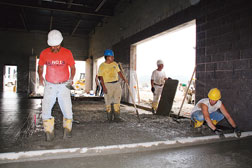 |
| Local unions enjoy good relations, but operating engineers’ Sweeney (left below) has irked area consultants. (Photos by Tudor Hampton for ENR) |
Union leaders in Chicago have a saying: “Whatever happens in Washington stays in Washington.” With aggressive organizing and tight cooperation among local trades, union workers are gaining power.
“We kind of do our own thing,” says Tom Villanova, president of the Chicago and Cook County Building and Construction Trades Council, which represents 24 unions and 100,000 area workers. National union rifts have done little to stir dissent in the Midwest.
 |
A deadlock in June over a four-year contract for laborers ended after a four-day strike, the first of its kind in 15 years, that shut down hundreds of projects across the city. Workers emerged with lucrative wage-fringe hikes and a written agreement between trades to honor future strikes. “The laborers have their problems in Washington, [D.C.], but in Chicago, everybody stuck together,” Villanova says.
Building trades, including the city’s nearly 23,000 operating engineers, considered the short strike a victory. “It just reinforced our solidarity,” says James M. Sweeney, vice president of operators’ Local 150, which covers parts of Illinois, Indiana and Iowa.
Local 150 has more than doubled its membership in 20 years due to regional consolidation and controversial recruiting tactics. The latter has the union defending an antitrust suit in federal court filed last year by three engineering firms opposed to the targeting of drillers, material testers and quality-control technicians (ENR 12/27/04 p. 14). That follows an earlier program, “Operation Wrench,” in which the union successfully signed up equipment mechanics and truck drivers working for national rental firms and machinery dealers.
The engineers’ lawsuit, now in discovery, claims Local 150 “engaged in a pattern of trickery and sham efforts” to force firms into contracts through allegedly illegal “top-down” tactics such as secondary boycotts. Union officials admit their aggressive stance in using “ambulatory picketing,” a strategy to follow roaming technicians and demonstrate at union jobs. But they say it’s legal. “Once a group of workers wants us to represent them, we are going to do whatever we have to do to protect those workers,” says Sweeney.
Since it began the campaign five years ago, Local 150 has recruited 700 technicians, or 80% of the market. Many firms that declined to bargain have since closed.
The union now is training the technicians while building a $50-million apprenticeship facility in Wilmington, Ill., that will include testing laboratories. Union officials claim the program has increased the quality of training and note that the number of failed material tests on projects is dropping.
“I just don’t buy it,” says Mark Weiland, vice president of PSI, a consulting engineer in Oak Brook Terrace, Ill., and a lawsuit plaintiff. “Do you honestly think the people are doing a 30% better job today than they were two years ago?”
Bill Dugan, Local 150’s business manager, counters that many firms are glad to have the union training workers. “They are tickled to death that we are doing this for them,” he says. Union supporters hail Sweeney, who has led Local 150’s organizing efforts since 1986, as a latter-day pioneer fighting to keep the movement alive. Others believe that he is illegally building a labor monopoly. Eventually, it may be up to a jury to decide.
 Related Links:
Related Links: 


Post a comment to this article
Report Abusive Comment